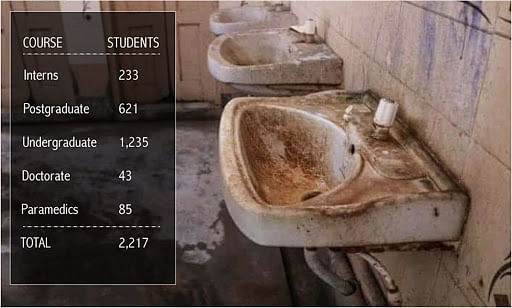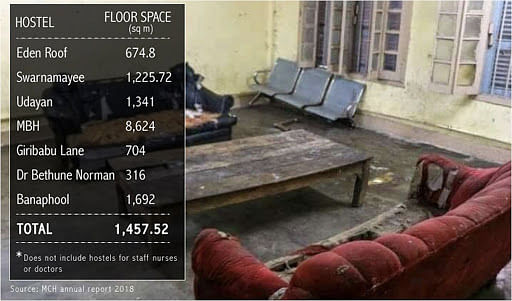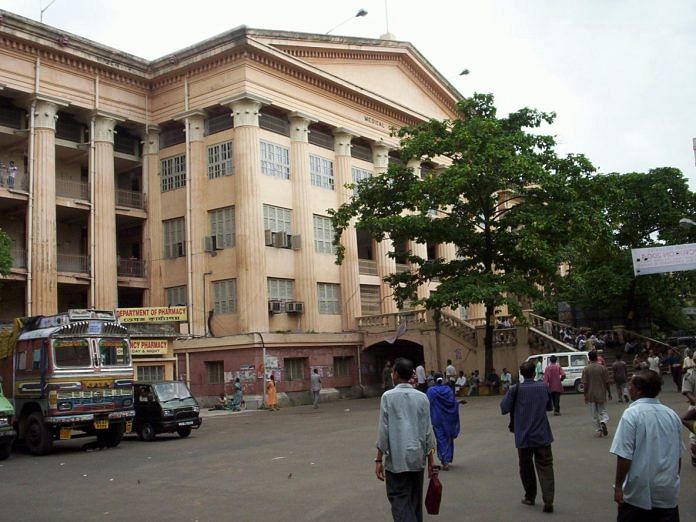Despite protests and assurances, the Medical College and Hospital administration has not made any improvements in the living conditions of its hostels.
Kolkata: A couple of months ago, the famous College Street in Kolkata was rocked by demonstrations held by budding doctors from the Medical College and Hospital (MCH). The reason was the abominable living conditions these students have to put up with at the institution’s hostels.
The peaceful protests went on for about a month in June and July, but were stonewalled by the authorities. Then, 10 undergraduates decided to start a fast unto death — the irony of being ready to die for better living conditions was not lost on anyone.
Yet, two months on, nothing has changed.
Also read: All India Students’ Association wants CCTV cameras in DU, not in JNU
Steeped in squalor
The 240-bed Main Boys’ Hostel (MBH) stands in a narrow lane, beside a three-storey slum and a pestilent rubbish dump. After 18-hour days spent in classes and clinics, the medics — who have slogged hard to even get this far through tough entrance exams — come ‘home’ to overcrowded rooms, unwashed toilets, and sometimes even a hail of tiles falling off the false roofs of the four-storey building.
The central courtyard features a heap of old mattresses, broken furniture and kitchen garbage piled up bonfire-style, only foetid and soaked in rainwater. The canteen smells like a soggy rag from yards away, while guest room nearby has two sofas, an AC and a water filter — all broken. But then comes the boys’ bathroom, which assaults pretty much all the senses together. When the plumbing breaks down, it stays broken — cleaning staff go missing and have to be paid out of the students’ pockets to please come by.
The MCH is one of India’s least expensive medical colleges: Its annual fee is about Rs 9,000, and students pay a nominal monthly charge of Rs 12 for living and Rs 32 for building maintenance. So nobody really expects the place to be the Great Eastern Hotel of yore, but students expect at least basic standards of accommodation and hygiene to be met.
But not only were their pleas ignored for years, senior students were then kept out of a new 11-floor building that came up in front of their eyes (more on that later).
The resulting protests made it briefly to the press before falling out of the news cycle. College authorities watched the starving students’ blood pressure dive, indifferent as if these doctors-to-be had just thrown a childish tantrum.
The students’ only grievance was that the old arrangements were untenable, and the only demand was for ‘hostel counselling’ to be held. This is the process by which students’ eligibility is judged (on categories such as seniority and distance of home town).
In August, a ‘hostel counselling’ session was held, and seniors were given the opportunity to apply for 60 places in the new building. There were hundreds of applicants, but officials are unwilling to talk about how many, or even how many people can be accommodated in the new 11-storey building.
No official figures
Dr U.K. Bhadra, the principal of MCH, gives off a disinterested air when quizzed about his 185-year-old institution’s ability to provide decent accommodation to its students. His office presents a stark contrast to what you’ve just left behind at the boys’ hostel — it’s air-conditioned, and stands in a high-ceilinged Victorian-era administrative building.
Instead of answering the question, he points at the wall opposite him, which bears photos of the distinguished physicians who have headed the college’s various departments through the years. “There are many departments in this college, why do you only ask about the hostels?”
College rules make it compulsory for 75 per cent of its interns, undergrad students, postgrad students and paramedics to live on campus. But there’s just no clarity on the actual number of students who live in these hostels, as Bhadra says “it’s a floating population”.
“They finish studies, but they don’t leave. That’s normal; happens everywhere. I have seen it happen at British Columbia University (in Canada).”
As per the MCH’s 2018 annual report, there is no official count of the number of students, or even the number of sanctioned spaces in the 12 hostels. This tally does not include the new 11-storey.
MBH secretary and third-year undergraduate student Ranojit Biswas explained the absence of these numbers.
“Most boarders come and go without the authority’s interference or knowledge. They timeshare their beds when they are taking exams — a senior may go home to revise, letting a junior borrow his bed for the duration to avoid a long commute,” he said.
“Sometimes they fit six beds in a dorm meant for two, and this game of ‘musical beds’ gets them through their MBBS years.”
Aniket Chatterjee, who hails from Purulia and was one of the students who sat on the hunger strike, said although a process exists for allocating beds fairly, the authorities had not put it to use for three years, on account of “running out of space”.
There’s enough space (or is there?)
According to the college’s annual report, there are 2,217 students on its rolls, 75 per cent of whom (about 1,662) need to stay on campus. Officially, not more than three students should live in the same room. But even so, the authorities are at pains to insist there’s more than enough space for the students, even without counting the new building.

The annual report mentions just seven of the 12 existing hostels (not even counting the new building), and mentions the total floor space as 14,577.52 sq. m — purportedly enough to provide each student about 9 sq.m. of space to keep a bed, desk, chair and wardrobe.
But the report makes no mention of any legroom for study, guests or recreation. It doesn’t mention the names of any of the other five hostels, which even principal Bhadra says he can’t remember. Nor does it take into account the overstaying students Bhadra himself mentioned.

Why freshers were rushed into the new building
The new building didn’t even have a cleaning service when freshers were rushed into it — allegedly without following allotment rules — to prevent a possible storming by dissatisfied senior students.
A rule instituted in March was purported to be the reason for this decision — that freshers couldn’t share a hostel with seniors, to prevent ragging. The MCH has had no reports of ragging or bullying for a long time.
Many of the students from MBH and other hostels interviewed for this story alleged that politics lies at the heart of the matter, though protester Aniket insists their movement was “apolitical”.
MBH is known as an old Communist haunt, “where most of the political problems arise”, according to Devarghya Mukherjee, a resident of the Giribabu Lane hostel.
Several interviewees said the Trinamool Congress has been making inroads into MCH, and has more or less succeeded in getting into the faculty and the administration. Trinamool Congress MLA Nirmal Maji is chairman of the MCH, breaking the rule that the chairman has to be an alumnus of the college.
Also read: Manipur University students living in chaos & uncertainty as anti-VC protests enter Day 58
Some allege that this move to separate the freshers and the seniors is plain and simple divide and rule — to try and recruit the young ones into the party fold.
But then there are also those who point towards chief minister Mamata Banerjee’s work towards outlawing student unions. They say the freshers are being cocooned from political brainwashing by their seniors, simply because “bhalo chhelemeyera eishob kore na (good boys and girls don’t do things like this)”.






